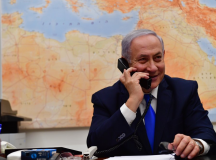Yossi Kuperwasser argues that whoever forms the next government should adopt a ‘Yes, but’ response to the expected American peace proposal, act against Iranian regional adventurism, fight against attempts to delegitimise the Jewish state, deepen the country’s strategic relations with the US and enhance cooperation with the pragmatic Arab states. This article has been updated by the author for the 17 September election.
Governing is first and foremost about prioritising, so when Israelis go to the polls again they are in fact choosing between priorities – a product of ideology, values, capabilities, challenges, political constraints and leadership.
The Right and the Left try to shape the debate as being between different priorities regarding the future of the Israeli-Palestinian conflict. Yet with the new US peace plan about to be presented to the parties, the ‘Blue and White’ party seemingly has no coherent policy on that issue. Benny Gantz claims that there is no longer any Right or Left and that the debate is about the kind of leadership Israel needs rather than where it will lead. In fact, most Blue and White voters come from the Centre-Left circles and so likely oppose the Right’s approach to the Palestinian issue. Meanwhile Avigdor Lieberman, who emerged from the first round as the potential kingmaker, has tried to present Israel Beytenu as a Right wing anti-Halachic State (Jewish Law) party. But, similar to Blue and White, it seems that he is less interested in the policy issues and rather wishes to force Netanyahu out of office.
THE TRUMP PEACE PLAN AND THE PALESTINIAN ARENA
Israel’s response to the plan will reflect its commitment to seek a peace that guarantees its security and so will probably be ‘Yes, but’. At the same time, Israel will have to:
- Clarify its red lines, namely that no lasting peace can be reached without: a Palestinian recognition of Israel as the nation state of the Jewish people (with a democratic government); a security plan that leaves the Jordan valley under Israeli responsibility and allows the IDF to deal with threats from the West Bank; and ending the hate indoctrination and incitement that inculcate in Palestinian minds support for terror and commitment to a Palestinian state ‘from the river to the sea’.
- If the Palestinians reject the plan, Israel together with the US administration should continue conveying the message that there is a price for Palestinian intransigence. They should seek to try and convince the Palestinians of the need to change their erroneous narrative and accept the existence of a Jewish people that has a sovereign history in this disputed holy land as well as accepting the need to share this land with them. One way to convey this message is by applying Israeli law over the legal Jewish settlements in Judea and Samaria, but not annexing them. (‘Applying the law’ means that the area is still a disputed land that is subject to future negotiations but a step was taken to normalize the life of those living there. It indicates to the Palestinians that if they stick to their intransigent opposition to any agreement in which they accept Israel, in whatever agreed upon borders, as the nation state of the Jewish people, then there is movement towards a new reality, even if at this stage it is reversible. ‘Annexation’ is more irreversible.)
- Continue with the current policies vis-à-vis Gaza and the status quo in the West Bank These are solid and reasonable policies in light of the complexities of the situation. If the threat from Gaza rises and it becomes clear that Hamas does not want to or is incapable in exercising a monopoly over the use of force from Gaza, Israel will have to be prepared to take harsher measures to protect its citizens, including forcing Hamas to give up its control of the Strip.
- Refrain from moving towards unilateral concessions disguised as ‘separation’ from the Palestinians. This is a dangerous idea as it ignores the Palestinian narrative and may lead to greater Palestinian terror while simultaneously causing higher tensions within Israeli society.
IRAN, RUSSIA AND RELATIONS WITH THE US
On most other National Security challenges there are very limited differences between the parties. Israel will have to: keep fighting against the threats emanating from Iran in Syria and elsewhere in the region – especially against Iranian efforts to improve Hezbollah’s rockets; continue to oppose the Iranian nuclear deal and cooperate with Washington in an effort to bring Europe on board; cooperate with Russia to maintain its freedom to operate against Iran in Syria; keep fighting against the attempt to delegitimise and boycott Israel and expose the antisemitic nature of anti-Zionism; keep and deepen the strategic relations with the United States while trying to stop the process that turns relations with Israel into a partisan issue; and further enhance cooperation with the pragmatic Arab states – both those with whom Israel has a peace agreement and with those whom it does not.
THE PRAGMATIC ARAB STATES
These pragmatic Arab states share the same view of the region and identify all radicals – from extremists such as ISIS, Al Qaeda and Iran’s leadership to those Muslim Brotherhood influenced states and entities such as Qatar, Turkey and Gaza – as dangerous threats. Israel should try to convince these pragmatic states to use the expected Palestinian rejection of the American peace plan as a justification for having closer ties with Israel. This may eventually help in pushing the Palestinians to adopt a more realistic approach towards the peace plan.
With the growing pressures on the Iranian regime and on the Palestinians (both the PA and Hamas) the probability of escalation might grow significantly. This means that Israel must continue to spend more on improving its military readiness and maintaining its superiority in intelligence, air, cyber and armed forces. This requires that the Israeli economy continue to flourish and that domestic unity is restored after what has been a bitter elections period. At this point the chances that such unity will emerge seem limited, but politics, and especially Israeli politics, have always been full of surprises.












































